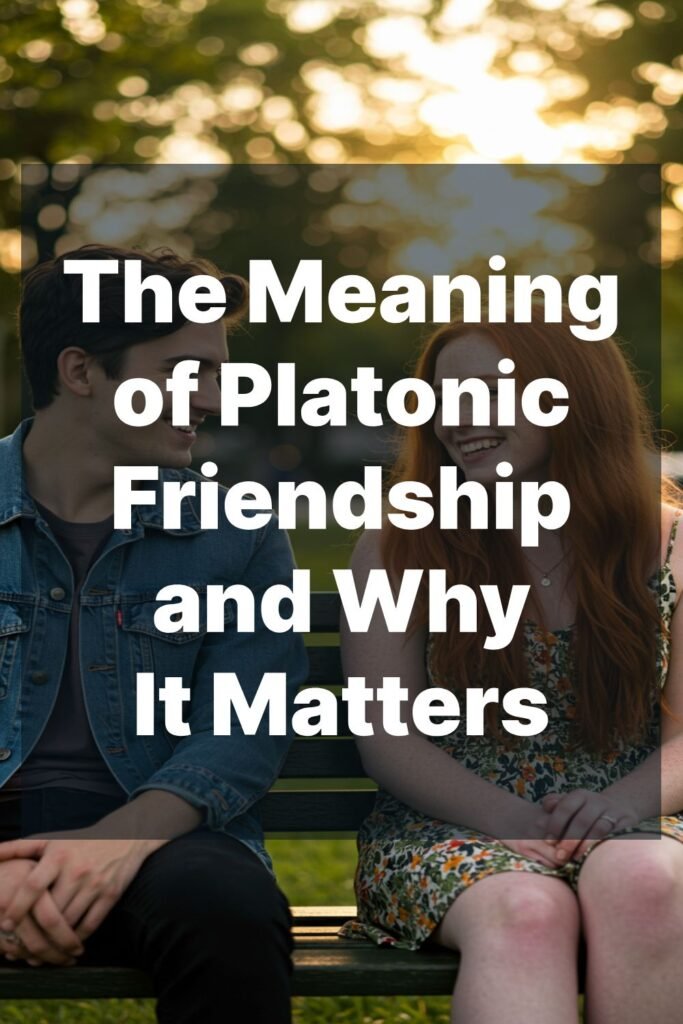
Human relationships are a rich tapestry of emotional bonds, ranging from romantic to familial, professional to spiritual. Yet among all these connections, one type of relationship is often misunderstood or overshadowed by its romantic counterpart—the platonic friendship.
In a world that glorifies romantic love and often defines closeness through passion or physical intimacy, the quiet strength of platonic friendship is an underappreciated gem. Rooted in deep emotional connection, mutual respect, and non-romantic affection, platonic friendships can be some of the most enduring and soul-nourishing relationships of our lives.
In this article, we’ll dive deep into what platonic friendship truly means, how it differs from other relationships, why it matters so much in today’s world, and how to recognize and nurture this special kind of bond.

What Is a Platonic Friendship?
A platonic friendship is a close and emotionally intimate relationship between two people that doesn’t involve romantic or sexual feelings. It’s built on trust, honesty, shared experiences, and a strong emotional connection—but not physical desire.
The word “platonic” comes from the Greek philosopher Plato, who spoke of a kind of love that transcended physical attraction. He believed love could exist on a spiritual and intellectual level, emphasizing connection between minds and souls rather than bodies.
In today’s terms, platonic friends might spend time together, confide in one another, and support each other through life’s highs and lows—but they’re not interested in turning the friendship into something romantic.
Key Characteristics of Platonic Friendships
1. No Romantic or Sexual Expectations
Platonic friendships thrive without the expectation of romance or sexual intimacy. Even if the emotional connection is strong, there’s no underlying hope for the relationship to evolve into something romantic.
2. Emotional Intimacy Without Physical Pressure
You can cry on their shoulder, share your deepest fears, or talk about your dreams without any awkward undertone. There’s safety in knowing that your vulnerability isn’t being misinterpreted.
3. Mutual Trust and Loyalty
In platonic friendships, loyalty isn’t about fidelity but about consistency. These friends stick with each other through thick and thin. They’re the ones you call at 3 a.m. because you know they’ll pick up.
4. Support Without Possessiveness
True platonic friends cheer you on in your relationships, celebrate your growth, and don’t feel threatened by your other social connections. There’s no jealousy—just genuine support.
5. Respect for Boundaries
Boundaries are understood and honored. You’re free to be who you are without pressure to act a certain way. If one friend needs space, it’s respected without drama.

Why Platonic Friendships Matter
1. They Fulfill Emotional Needs Without Romantic Complications
Not all emotional closeness must be tied to romance. Platonic friendships allow us to feel seen, heard, and valued without entering the emotional rollercoaster that often comes with dating or romantic relationships.
2. They Promote Mental and Emotional Well-Being
Studies show that having close, non-romantic friendships can reduce stress, depression, and loneliness. Platonic friends often act as emotional anchors, offering stability and a deep sense of belonging.
3. They Encourage Personal Growth
With no romantic undertone, platonic friends can offer honest advice, help us reflect, and keep us grounded. They challenge us, lift us, and grow with us.
4. They Add Dimension to Our Social Life
Romantic relationships tend to dominate time and emotional energy. Platonic friendships give us an additional outlet for fun, depth, and meaningful conversation without the intensity that comes with romantic exclusivity.
5. They Show Us a Different Kind of Love
Love isn’t one-size-fits-all. Platonic friendships expand our understanding of love beyond romance, showing us that unconditional support and care can come from unexpected places.
Common Challenges in Platonic Friendships
While platonic friendships are beautiful, they aren’t always smooth sailing. Like any relationship, they come with their own set of challenges.
1. Jealousy (Especially When New Relationships Arise)
Sometimes, romantic partners may feel threatened by a close platonic friendship—especially if it’s with the opposite sex. It’s crucial to set and respect boundaries, and to communicate openly with all parties involved.
2. Misinterpretation of Feelings
At times, one person might start to develop romantic feelings, leading to confusion, tension, or heartbreak. Clear, compassionate communication is vital in preserving the friendship.
3. Pressure from Society
Society often pushes the idea that “men and women can’t just be friends.” This belief can place undue pressure on platonic pairs to justify or prove the purity of their connection.
4. Life Transitions
Marriage, parenthood, job changes, or relocation can all impact the frequency or depth of platonic friendships. It takes intentional effort to keep the connection alive through life’s shifts.
Healthy Boundaries That Protect Platonic Bonds
Boundaries are essential in maintaining the integrity and longevity of platonic friendships.
- Physical boundaries: Hugs, cuddling, or physical affection should be mutually comfortable and clearly defined.
- Time boundaries: Respecting each other’s time, especially if one or both friends are in romantic relationships, is key.
- Emotional boundaries: Sharing is good, but expecting a platonic friend to meet all your emotional needs can be draining.
- Social boundaries: Understand and respect the friend’s other commitments, including romantic or familial relationships.
Signs You’re in a True Platonic Friendship
Wondering whether your bond is truly platonic? Here are some telltale signs:
- You feel emotionally safe with them.
- You don’t feel the need to impress them—just to be yourself.
- You can go weeks without talking and pick up right where you left off.
- You have no desire to turn the friendship into something romantic.
- You talk about everything, including your crushes or relationships, openly.
- They respect your boundaries without question.
- You share laughter, pain, adventures, and even silence comfortably.
- You feel inspired, not drained, after spending time together.

The Unique Value of Cross-Gender Platonic Friendships
Much of the skepticism around platonic friendships arises when they occur between men and women (or anyone attracted to the other). But when boundaries are respected and intentions are clear, cross-gender platonic friendships can be incredibly rewarding.
They offer different perspectives, balance, and growth opportunities. They challenge gender stereotypes and help develop a deeper understanding of the opposite sex, often contributing to emotional maturity and empathy.
Platonic Love in Popular Culture and History
Though romantic love dominates movies and books, platonic love has always had a place in stories that touch the heart:
- Sherlock Holmes and Dr. Watson: A deep friendship built on trust and loyalty.
- Harry Potter and Hermione Granger: A classic example of an emotionally rich, yet strictly platonic, friendship.
- Oprah Winfrey and Gayle King: A real-life testament to the power of lifelong platonic love and support.
How to Nurture a Platonic Friendship
1. Check In Regularly
Life gets busy, but even a simple “thinking of you” message can go a long way in maintaining connection.
2. Celebrate Milestones
Be there for birthdays, achievements, and life events. These shared memories deepen your bond.
3. Be Honest and Vulnerable
Authenticity is the heartbeat of any deep relationship. Let them know when you need support—or when you’re just grateful for their presence.
4. Protect the Friendship from Outside Pressure
Don’t let societal norms or external judgments undermine what you both know to be true: your friendship is valid, beautiful, and necessary.
Final Thoughts: Why Platonic Friendship Is a Gift
Platonic friendship is one of the most grounding, healing, and enriching experiences we can have. It gives us a place to be our truest selves, to love without conditions, and to grow without romantic complications.
In a world that often screams “you’re incomplete without romance,” platonic love whispers, “you are already enough—and someone sees that in you.”
It’s a reminder that love wears many faces. And sometimes, the deepest love of all is the one that doesn’t need a kiss to be real.





